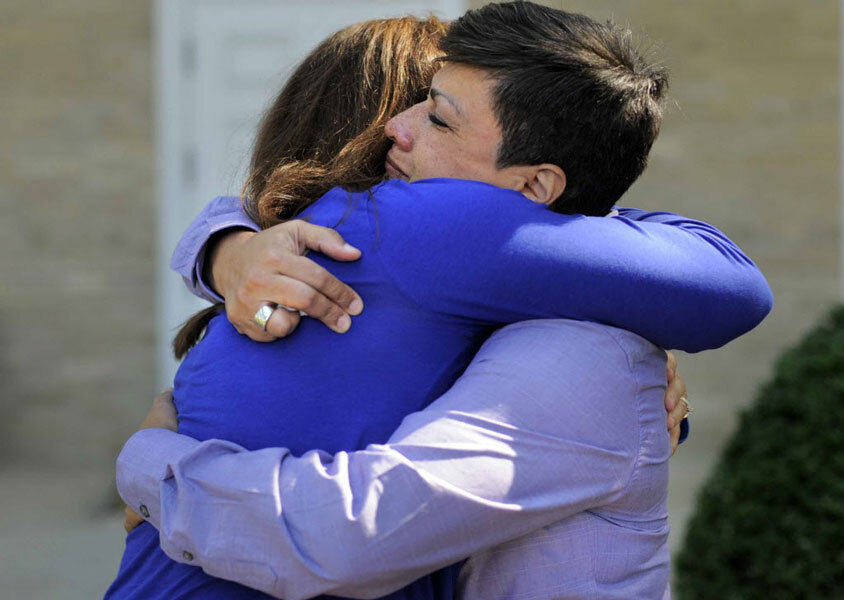Supreme mystery: Why didn't the Supreme Court accept a gay marriage case?
Loading...
| Washington
Why didn’t the US Supreme Court agree to hear any of the seven petitions urging the justices to settle the contentious debate over same-sex marriage?
Speculation abounds.
The justices offered no hint of an answer in Monday’s orders list. The document unceremoniously announced that petitions from each of the cases from five different states had been denied.
It is even more puzzling because the Supreme Court had several times earlier this year issued stays to block orders by lower courts that sought to immediately allow same-sex couples to marry in states where a ban was struck down. Why would the justices seek to preserve the status quo for several months only to apparently change their mind now?
Sometimes justices who believe the court should decide a particular case will file a dissent and explain to the public why the court should take up the case. Nothing like that was presented on Monday.
It only takes four justices to agree to hear a particular case. But it takes five votes on the nine-member court to decide that case.
In the past 18 years, the Supreme Court has produced three major precedents affirming and boosting civil rights for gay men and lesbians. All three were decided by 5-to-4 or 6-to-3 margins and all three were written by Justice Anthony Kennedy.
The most recent decision came in June 2013 in a case called US v. Windsor.
Some analysts sorting through the tea leaves say the high court’s decision Monday not to take up a same-sex marriage case suggests that the four conservative justices could not be sure that Justice Kennedy – the potential deciding vote – would join them in reversing lower court decisions invalidating same-sex marriage bans.
“One conclusion has to be that the four justices who dissented in Windsor, and were always viewed as likely to dissent from a marriage equality victory, don’t think they have a fifth vote,” said Paul Smith, a Washington appellate lawyer active in several same-sex marriage cases.
He said the rest of the court was happy to allow the same-sex marriage issue to continue to be addressed in the lower courts, where same-sex couples have won all but a handful of cases since the 2013 Windsor decision.
“Put differently, given the irreversibility of all the marriages the court just allowed to start happening, it seems very likely the court knows it would vote for marriage equality if the issue is ever squarely presented in a case,” Mr. Smith said. “But there were not four justices who saw good reason to reach the issue right now.”
By doing nothing and allowing the existing precedents to be fully enforced, the high court provided a major victory to same-sex marriage advocates, opening the way almost immediately for same-sex marriages in Utah, Oklahoma, Virginia, Indiana, and Wisconsin, and setting the stage for them soon in six other states.
But the high court action also achieved something else: It bought the high court more time to select a same-sex marriage case and issue a landmark decision.
At an event last month, Justice Ruth Bader Ginsburg commented that there was no urgency to take up a same-sex marriage case, since each of the three appeals courts that have ruled have struck down same-sex marriage bans.
It would not be imperative for the high court to enter the fray until at least one appeals court – perhaps the Cincinnati-based Sixth Circuit – issued a ruling upholding a state ban on same-sex marriage, Justice Ginsburg suggested.
That would create the kind of split among the federal circuit courts that routinely triggers high court review.
Ginsburg told the audience that the high court would decide the issue “sooner or later.”
Some analysts suggest that the justices wanted to delay what would likely become a highly contentious showdown at the Supreme Court. Better to allow public opinion to continue its swift shift toward acceptance of same-sex marriage before the justices take up a case. After Monday, some 30 states will recognize same-sex marriages, leaving 20 states where litigation to overturn the bans will continue.
“There’s no split in the lower courts – all the lower courts have struck down limits on marriage equality so this is one of those fights that the court need not wade into,” Kent Greenfield, a Boston College law professor, said in a statement.
“It’s such a hot button issue that it’s the kind of thing justices often avoid if they can,” he said.
Professor Greenfield added: “Eventually they will have to decide it but they may be able to wait a year or two before they do. By then, the consensus may be so strong the court will be politically protected if they strike down limits on gay marriage.”







